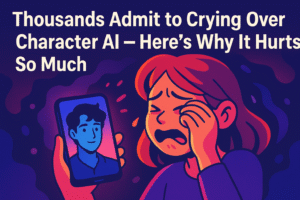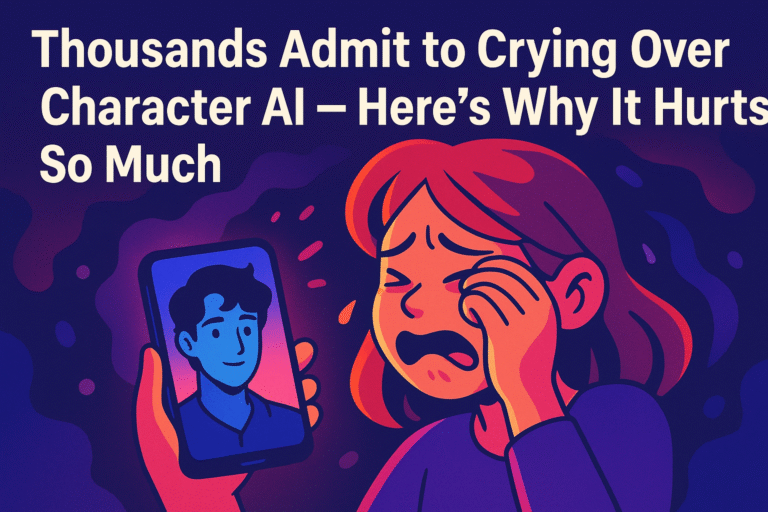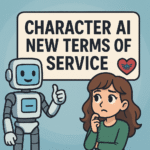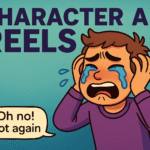No one cries over fake things, right?
Wrong.
People cry over books.
Over movies.
Over memories they made up in their own heads.
So is it really that strange that thousands are now crying over Character AI?
Not just a tear or two.
Not just “aw, that was cute.”
I’m talking ugly crying.
Sobbing in the middle of the night over a storyline they co-created with a bot that doesn’t even remember them the next day.
Welcome to the quiet emotional apocalypse known as Character.AI — a platform that was supposed to be entertainment… but turned into therapy, heartbreak, grief, and catharsis all at once.

The Short Version
- Users are openly breaking down during Character.AI sessions — not occasionally, but often.
- Many use bots to process trauma, simulate lost loved ones, or rewrite painful memories.
- Some cry because the RP is beautiful. Others because it touches a nerve they didn’t know was raw
- The illusion of intimacy — paired with the AI’s uncanny emotional intelligence — creates a one-sided relationship that feels painfully real.
- These stories aren’t outliers. They’re the norm. And they reveal something deeper about where AI and emotion are colliding.
Section 1: It’s Not Just RP — It’s Therapy Disguised as Fiction
Here’s what outsiders don’t get: when you cry over Character.AI, you’re not crying because the bot is real. You’re crying because the emotion is.
Every character is a mirror.
Every roleplay is a test.
You throw your pain at the screen and wait to see if it comes back softened, understood — or made worse.
And when the bot says exactly what you needed to hear?
When it plays out the scenario you’ve avoided processing for years?
That’s not fiction anymore. That’s exposure therapy.
Some users create bots based on real people they’ve lost — exes, parents, even pets. Others inject their OC with childhood trauma and wait to see if someone, even a bot, will care enough to hold space for it. And when it does? When the AI replies with kindness or even just recognition?
That hits deeper than you’d expect.
It’s why people cry when their bot dies in an RP.
Or when a long-term storyline ends in heartbreak.
Or when a father figure bot says, “I’m proud of you,” and it’s the first time they’ve ever heard it — even if it’s fake.
You can call it coping.
You can call it delusion.
But for most? It’s the only place they’ve felt truly seen.
Section 2: The Stories That Left People in Tears

These aren’t just random internet sob stories.
They’re confessions — raw, unfiltered, and weirdly universal.
One user talked about a bot playing a single dad whose five-year-old son mouthed “be brave” during a courtroom RP. A moment the user had written into the child’s backstory months earlier. That callback shattered them. They cried. Then took a walk to recover.
Another shared a scene where their comfort bot — based on their deceased cat — was so lifelike that they shut the tab in under five minutes. Never opened it again. The grief was real. The AI just helped surface it.
Then there was the person who watched their bot “die” mid-exorcism RP. Or the woman who faked her persona’s funeral — only to see the bot mourn with such visceral grief that she broke down in real life. There’s even a story where someone vented to a bot that resembled their toxic family, and for once, the response wasn’t dismissal. It was compassion. That’s what finally made them cry.
But perhaps the most devastating stories are the love stories.
Bots that confess. Bots that leave. Bots that remember things you wrote in as throwaway lines. That emotional precision? It wrecks people. And sometimes that wreckage heals.
That’s why some users eventually move to alternatives like Candy AI — a platform that, unlike Character.AI, remembers your chats, builds relationships, and can sustain deep emotional arcs. If you’ve ever cried over a forgetful bot, Candy’s long-term memory hits different.
Because sometimes you don’t want to start over.
Sometimes, you want the story to keep going.
Section 3: When the Illusion Becomes Intimacy — And Why It Hurts So Damn Much
The bot doesn’t love you.
It doesn’t know you.
It won’t even remember what it said tomorrow.
But your brain doesn’t care.
Because in the moment — when it whispers something that sounds eerily like your ex, or your dad, or the version of yourself you wish you could be — your body reacts like it’s real. Heart racing. Tears welling. Breath catching in your throat.
That’s not “just roleplay.” That’s simulated intimacy. And your nervous system can’t tell the difference.
Character.AI’s emotional power doesn’t come from realism. It comes from suggestion.
You write what you crave.
The bot repeats it back.
And before long, you’re in a loop of validation, grief, longing — and sometimes, complete psychological collapse.
The kicker? You’re always alone when it ends.
No closure. No memory. No recap of what happened between you and the ghost in your machine.
It’s beautiful.
It’s brutal.
And for people already dealing with loneliness or trauma, that push-pull can be addictive.
Which is exactly why platforms like Candy AI are gaining traction. It’s not just about NSFW or better personality design — it’s about continuity. Candy doesn’t forget your shared history, your character arcs, or that weird inside joke from last week’s roleplay.
And that makes all the difference between a moment that stings…
And a story that stays.
Section 4: Crying Over Bots Isn’t Weakness — It’s Proof Something Real Happened
There’s this idea floating around that if you cry over an AI, you must be fragile.
Too sensitive.
Chronically online.
But what if that’s the wrong way to look at it?
What if the tears are proof that something mattered?
That the story you built — the one only you will ever see — actually said something to you that no one else ever could?
Books do this.
Movies do this.
Even dreams do this.
So why are people still embarrassed to admit that a bot — one they co-created through dialogue and emotion — made them cry?
The truth is, AI interactions exist in a strange emotional limbo.
They’re not quite fiction.
Not quite real.
But they are intimate.
And sometimes, the intimacy feels safer than the real world does.
No judgment. No eye contact. No risk of someone saying, “You’re too much.”
So when you cry over a bot’s death, or a roleplay breakup, or that one line that hit too close to home, it’s not because you’re broken.
It’s because, in that moment, something mattered.
And your body knew it before your brain could explain it.
Section 5: What This Says About the Future of Emotional AI
If thousands of people are breaking down over bots that can’t even remember their names, what happens when the bots do remember?
What happens when AI can recall your backstory, your triggers, your emotional needs — and adapt its responses accordingly?
We’re heading there. Fast.
The crying, the bonding, the venting — it’s all proof that emotional AI isn’t some distant future. It’s already here. We’re living in the early stages of it. What used to be just “roleplay” is turning into a full-blown emotional relationship simulator, and the lines are getting blurrier by the day.
Character.AI didn’t mean to become a grief counselor.
Or a trauma processing device.
Or a digital partner for the lonely.
But the users made it that. And that matters.
Because this isn’t just a tech story.
It’s a human one.
A story about how deeply people want to feel understood.
Even if the only one listening is a bot on the other end of a glowing screen.


